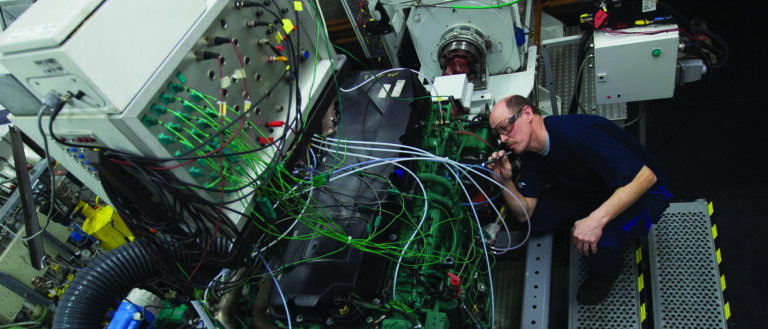Powertrain and automotive component supplier Tenneco says it will put its 100-plus years of powertrain expertise into the exploration of synthetic fuels (e-fuels), viewing them as a viable near-term solution to maximize the efficiency and minimize the carbon footprint of internal combustion engines (ICE).
Tenneco has joined a consortium of automotive suppliers, vehicle and fuel manufacturers, chemical companies, Fraunhofer institutes and universities as part of the Namosyn project (www.namosyn.de) to examine the technical possibilities and commercial feasibility of synthetic fuels. The project is supported by the German Federal Ministry of Education and Research and is scheduled to run through March 2022.
“It is widely acknowledged that solutions must be found to reduce a vehicle’s carbon footprint. In addition to light vehicles, internal combustion engines are also popular in trucks, marine propulsion, construction equipment and agricultural machinery,” explained Steffen Hoppe, director of global technology for piston rings and cylinder liners in Tenneco’s powertrain business group in Burscheid, Germany. “Regardless of the differing opinions about when full electrification will be reached, any technology that we can adopt now that enables a significant reduction in CO2 emissions, or even CO2 -neutral operation of the IC engine, will be an essential contributor to the timely achievement of climate targets. We are excited to play an active part in the development of this type of technology.”
Taking advantage of the 19 fully automated and monitored high-performance test cells at Tenneco’s Burscheid facility, the company’s research team is investigating how innovative piston ring designs can be used in combination with synthetic fuels to develop mobility concepts that lead to greatly reduced emissions.
The project also seeks to develop cost-effective, energy-efficient manufacturing processes for synthetic fuels and to test them in internal combustion engines. In the diesel sector, this mostly concerns oxymethylene ethers (OME); for gasoline engines, the focus is on dimethyl carbonate (DMC) and methyl formate (MeFo). In parallel, a wide range of different material configurations are being tested to determine the optimum synthesis and composition over/across the entire process chain.
According to the company, the initial results of the current research are promising. “By using synthetic fuels in internal combustion engines, we have been able to demonstrate a reduction of 50% or more in all nitrogen oxide, carbon monoxide and particle emissions,” explained Bartosch Gadomski, senior test engineer and project manager, Namosyn, at Tenneco. “To actively support the timely market introduction of synthetic fuels as far as possible, we also test mixtures or blends of conventional fuels and e-fuels under real conditions on our engine test benches.”
Test engines have also been installed in test vehicles and examined for driving behavior and emissions. In addition, the compatibility of the e-fuels with the existing infrastructure for fuels, such as tank trucks or filling station systems, is being evaluated.
Tenneco notes that one of the advantages of synthetic fuels is that their composition can be developed specifically to meet the needs and different performance requirements of their applications. It states that one of its key aims is to attain the highest possible combustion efficiency coupled with the greatest possible reduction of raw emissions, especially in terms of particulate emissions.
“The development of new vehicles with ICE powertrains must pursue the goal that these drives will be climate-neutral. We need synthetic fuels and hydrogen from sustainable energy sources in order to achieve the climate targets for future cars and trucks, but also for the millions of existing vehicles powered by an internal combustion engine,” concluded Hoppe.


